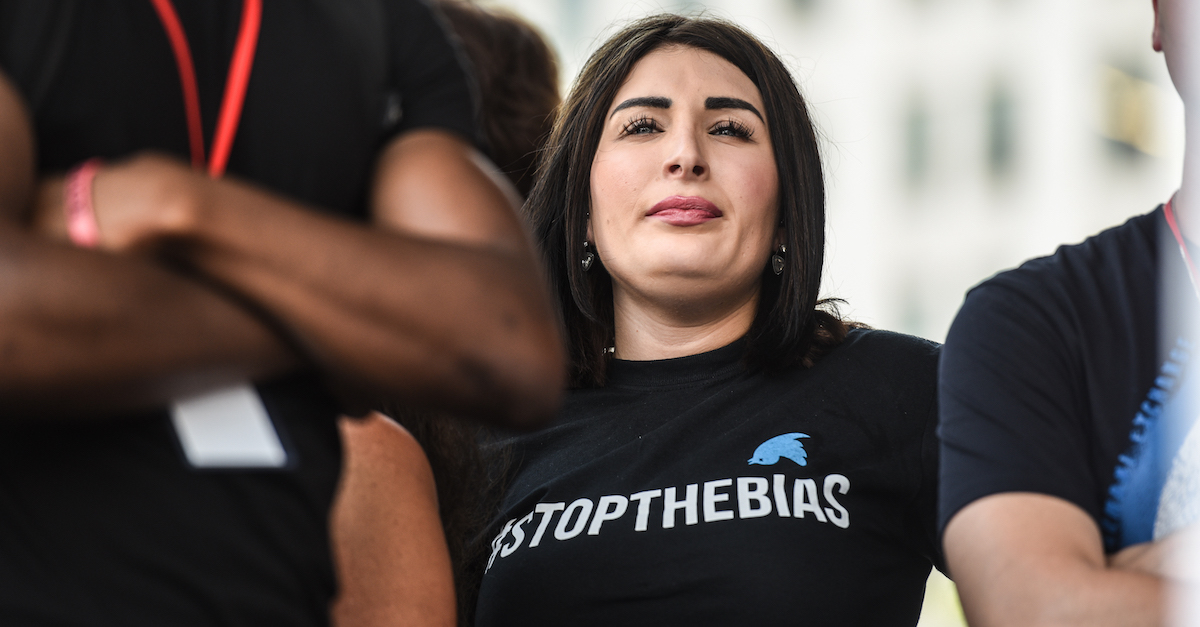
A federal court dismissed activist Laura Loomer’s lawsuit against several tech platforms on Wednesday. The complaint alleged a far-flung conspiracy to censor conservative speech.
The U.S. Court of Appeals for the D.C. Circuit added insult to injury by cavalierly noting at the outset that “the issues” at stake in the original lawsuit “do not warrant a published opinion.”
In 2018, Loomer and Freedom Watch, a non-profit and right-wing legal advocacy organization founded and run by attorney Larry Klayman, sued Google, Facebook, Twitter and Apple over allegations that the platforms had violated the First Amendment, the Sherman Antitrust Act and the District of Columbia Human Rights Act.
Specifically, the duo alleged that those platforms worked together to “intentionally and willfully suppress politically conservative content.”
The district court found that the plaintiffs “failed to tie [their] concerns to colorable legal claims” and dismissed the lawsuit.
U.S. District Judge Trevor McFadden explained:
Here, the Plaintiffs have failed to allege state action. They suggest that the Platforms are “quasi-state actors because they regulate their public platforms, thereby regulating free speech within their public forums.” But an entity can only be a “state actor” if “there is a sufficiently close nexus between the State and the challenged action of the regulated entity so that the action of the latter may fairly be treated as that of the State itself.” The Plaintiffs do not show how the Platforms’ alleged conduct may fairly be treated as actions taken by the government itself. Facebook and Twitter, for example, are private businesses that do not become “state actors” based solely on the provision of their social media networks to the public.
The three-judge panel on the D.C. Circuit offers tidy discussions of law throughout their unanimous per curiam decision that essentially tracks with the lower court’s findings as to why the lawsuit fails. Essentially, the court determined, there isn’t much of anything legal about the conservative activists’ complaints at all.
The court does, however, allow the plaintiffs to assert standing.
“The general allegation that the Platforms conspired to suppress Freedom Watch’s audience and revenue, combined with Freedom Watch’s representations that its audience and revenue declined, suffices to establish standing,” the decision notes.
But that’s where the winning ends. While Loomer and Freedom Watch were free to complain–and to have the court take their complaints seriously at first glance–they ultimately failed to state any complaints that the law and the courts are bound to actually care about or, more to the point, to actually do anything about.
Per the decision, at length:
Freedom Watch’s First Amendment claim fails because it does not adequately allege that the Platforms can violate the First Amendment. In general, the First Amendment “prohibits only governmental abridgment of speech.” Manhattan Cmty. Access Corp. v. Halleck. Freedom Watch contends that, because the Platforms provide an important forum for speech, they are engaged in state action. But, under Halleck, “a private entity who provides a forum for speech is not transformed by that fact alone into a state actor.” Freedom Watch fails to point to additional facts indicating that these Platforms are engaged in state action and thus fails to state a viable First Amendment claim.
In other words, the First Amendment is typically only a limitation on the government and it only protects citizens who have been harmed by the government. Because tech platforms are not the government, the First Amendment does not apply to them. There are various shades and degrees of when private entities are tangentially impacted by the First Amendment’s free speech guarantee but none of that jurisprudence has anything to do with tech platforms blocking certain users or demonetizing certain types of accounts.
The court, in a similarly-themed discussion, dismissed claims under the D.C. Human Rights Act which prohibits discrimination on the basis of political affiliation in “any place of public accommodations” because, in line with the district court’s earlier decision, “the alleged place of public accommodation must be a physical location.”
Interestingly, the D.C. Attorney General’s Office, in a strange bedfellows alignment, filed an amicus brief arguing alongside Loomer and Freedom Watch that sought to “reject a physical location requirement” for application of the law. The court ultimately rejected that argument by simply noting that they have ruled on the issue before; the district court cited a previous opinion by the appeals court which interpreted the law narrowly.
“[T]he D.C. Court of Appeals has interpreted this statute and at minimum, its interpretation is a reasonable one,” the judges wrote–referring to themselves. “We have no basis to believe it would reach a different conclusion on reconsideration.”
The plaintiff’s antitrust claims also failed because, according to the court, there was simply no evidence presented that the tech platforms had unlawfully conspired at all.
“Freedom Watch argues that we should infer an agreement primarily from the Platforms’ parallel behavior, as each company purportedly refused to provide certain services to Freedom Watch,” the decision notes. “But, as the district court explained, parallel conduct alone cannot support a claim under the Sherman Act.”
“Freedom Watch puts forth two additional factors that it claims suggest conspiracy: that the Platforms are pursuing a revenue-losing strategy and that they are motivated by political goals,” the decision goes on. “But Freedom Watch does not explain why either factor tends to show an unlawful conspiracy, rather than lawful independent action by the different Platforms.”
Read the court’s full decision below:
Freedom Watch v. Google Dis… by Law&Crime on Scribd
[image via Stephanie Keith/Getty Images]